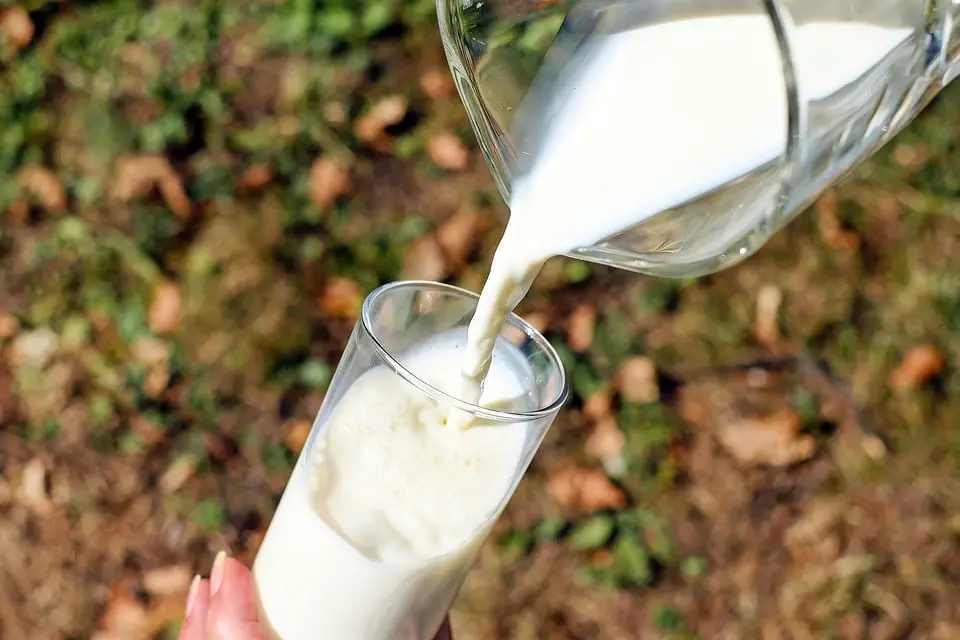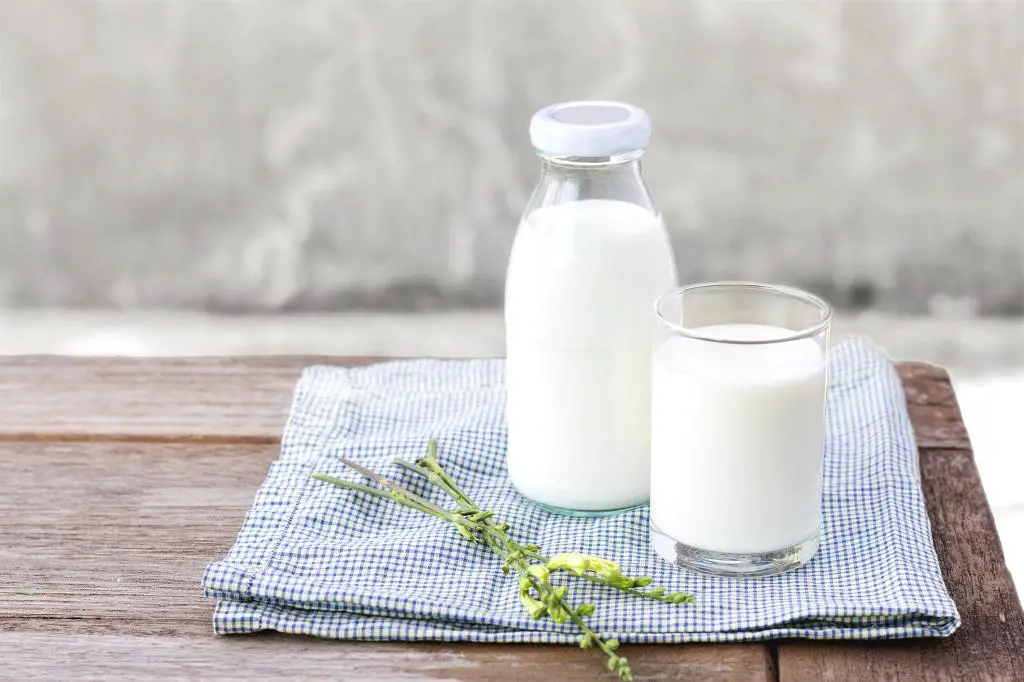
There is a lot of debate around whether or not milk makes you taller. Some people swear by it, while others think the benefits are overrated. But Does Milk Make You Taller? Many people believe that dairy products are essential for healthy growth and development. In this blog post, we’ll take a look at the evidence and see if there’s a link between milk and height. We’ll also discuss some of the possible reasons why milk might impact height, and consider whether drinking milk is worth it in terms of height gain. Stay tuned to find out more!

Benefits of milk:
There are many nutrients in milk that are essential for growth and development, including calcium, protein, and vitamin D.
Calcium is necessary for the formation of bones and teeth. It also helps regulate muscle contractions, which is important for proper growth and development.
Protein is an essential building block for the body. It helps build and repair tissues, and it is also necessary for the production of hormones and enzymes.
Vitamin D helps the body absorb calcium, which is essential for bone health. It also promotes proper muscle function and growth.
In addition to these essential nutrients, milk also contains other beneficial compounds such as conjugated linoleic acid (CLA) and omega-3 fatty acids. CLA has been shown to promote weight loss and muscle growth, while omega-3 fatty acids are essential for brain health.

Risks of milk:
While milk is a good source of many nutrients, it also contains saturated fat and cholesterol. These nutrients can contribute to heart disease and other health problems.
Milk also contains lactose, which is a type of sugar that can cause gastrointestinal issues in some people.
Some people may also be allergic to milk proteins. Symptoms of a milk allergy include hives, wheezing, and nausea.
Factors influencing a person’s height:
1. Genetics:
The most significant factor that determines how tall a person will be is genetics. Tall parents are more likely to have tall children, and short parents are more likely to have short children. This is because height is determined by genes, which are passed down from parents to their children.
2. Environment:
While genetics plays the biggest role in determining height, the environment can also play a role. For example, people who live in areas with high altitudes tend to be shorter than those who live at lower altitudes. This is because the air is thinner at higher altitudes, which can impact growth and development.
3. Diet:
What a person eats can also affect their height. For example, deficiencies in certain nutrients, such as vitamin D and calcium, can lead to stunted growth. Eating a balanced diet that includes all the essential nutrients is important for proper growth and development.
4. Health:
Certain health conditions can also impact height. For example, diseases like dwarfism and gigantism can cause people to be shorter or taller than average, respectively.
5. Age:
Age is also a factor that determines the height. Once a person reaches adulthood, they are unlikely to grow any taller. This is because the bones stop growing once a person reaches their full adult height. Now that we know some of the factors that influence height, let’s take a closer look at the link between milk and height.

Milk and height: Does Milk Make You Taller?
As we mentioned earlier, there is no scientific evidence to support the claim that milk makes you taller. However, many people believe that drinking milk can help boost growth. This is because milk is a good source of nutrients that are essential for growth and development, such as calcium, protein, and vitamin D.
While there is no direct link between milk and height, drinking milk may help you reach your full potential height. This is because adequate intake of these essential nutrients is necessary for proper growth and development. So if you’re looking to maximize your height, be sure to include milk in your diet.
Does Milk Help A Child Grow?
There is no scientific evidence to support the claim that milk makes you taller. However, milk is a good source of many nutrients that are essential for growth and development, including calcium, protein, and vitamin D. Additionally, some studies have shown that drinking milk can help promote weight loss and muscle growth. While there are some potential risks associated with drinking milk, such as gastrointestinal issues and allergies, these risks are typically low in people who do not have a history of milk intolerance or allergies. Overall, drinking milk is generally safe and may provide some benefits for growth and development.
How much milk should a child drink?
There is no one-size-fits-all answer to this question, as the amount of milk a child should drink depends on factors such as age, weight, and activity level. However, the American Academy of Pediatrics recommends that children consume 2-3 cups (16-24 ounces) of milk per day. Ultimately, it’s important to talk to your child’s doctor about how much milk is right for them.
Can adults drink milk to improve their height?
There is no scientific evidence to support the claim that milk makes you taller. However, as we mentioned earlier, milk is a good source of many nutrients that are essential for growth and development, including calcium, protein, and vitamin D. Additionally, some studies have shown that drinking milk can help promote weight loss and muscle growth. While there are some potential risks associated with drinking milk, such as gastrointestinal issues and allergies, these risks are typically low in people who do not have a history of milk intolerance or allergies. Overall, drinking milk is generally safe and may provide some benefits for growth and development.

What Make You Taller?
There are a number of factors that can affect height, including genetics, health, age, and nutrition. While there is no guarantee that you will be able to increase your height, there are some things you can do to help you reach your full potential height. For example, eating a balanced diet that includes all the essential nutrients is important for proper growth and development. Additionally, drinking milk may help promote weight loss and muscle growth. Ultimately, it’s important to talk to your doctor about what you can do to maximize your height.
FAQs
Does drinking cow’s milk help children grow taller?
There is no scientific evidence to support the claim that milk makes you taller. However, milk is a good source of many nutrients that are essential for growth and development, including calcium, protein, and vitamin D. Additionally, some studies have shown that drinking milk can help promote weight loss and muscle growth. While there are some potential risks associated with drinking milk, such as gastrointestinal issues and allergies, these risks are typically low in people who do not have a history of milk intolerance or allergies. Overall, drinking milk is generally safe and may provide some benefits for growth and development.
Does Almond Milk Make You Taller?
Almond milk is a good source of many nutrients that are essential for growth and development, including calcium, protein, and vitamin D. Additionally, some studies have shown that drinking almond milk can help promote weight loss and muscle growth. While there are some potential risks associated with drinking almond milk, such as gastrointestinal issues and allergies, these risks are typically low in people who do not have a history of almond milk intolerance or allergies. Overall, drinking almond milk is generally safe and may provide some benefits for growth and development.
Does Milk Make You Taller At 14?
There is no scientific evidence to support the claim that milk makes you taller. However, milk is a good source of many nutrients that are essential for growth and development, including calcium, protein, and vitamin D. Additionally, some studies have shown that drinking milk can help promote weight loss and muscle growth. While there are some potential risks associated with drinking milk, such as gastrointestinal issues and allergies, these risks are typically low in people who do not have a history of milk intolerance or allergies. Overall, drinking milk is generally safe and may provide some benefits for growth and development.
Can Milk Make You Grow Taller After 18?
There is no scientific evidence to support the claim that milk makes you taller. However, milk is a good source of many nutrients that are essential for growth and development, including calcium, protein, and vitamin D. Additionally, some studies have shown that drinking milk can help promote weight loss and muscle growth. While there are some potential risks associated with drinking milk, such as gastrointestinal issues and allergies, these risks are typically low in people who do not have a history of milk intolerance or allergies. Overall, drinking milk is generally safe and may provide some benefits for growth and development.
How Can A 14 Girl Grow Taller?
There is no single answer to this question as everyone grows at different rates and there are many factors that can affect height. However, some things that may help promote growth include eating a balanced diet that includes all the essential nutrients, drinking milk, and getting enough exercise. Additionally, it’s important to talk to your doctor about what you can do to maximize your height.
What drinks make u grow taller?
There is no scientific evidence to support the claim that any specific drink can make you taller. However, milk is a good source of many nutrients that are essential for growth and development, including calcium, protein, and vitamin D. Additionally, some studies have shown that drinking milk can help promote weight loss and muscle growth. While there are some potential risks associated with drinking milk, such as gastrointestinal issues and allergies, these risks are typically low in people who do not have a history of milk intolerance or allergies. Overall, drinking milk is generally safe and may provide some benefits for growth and development.
Can stretching make you taller?
There is no scientific evidence to support the claim that stretching can make you taller. However, some people believe that stretching and other forms of exercise can help promote growth. Additionally, it’s important to talk to your doctor about what you can do to maximize your height.

What food makes you taller?
There is no single food that can make you taller. However, a balanced diet that includes all the essential nutrients is important for growth and development. Additionally, some studies have shown that drinking milk can help promote weight loss and muscle growth. While there are some potential risks associated with drinking milk, such as gastrointestinal issues and allergies, these risks are typically low in people who do not have a history of milk intolerance or allergies. Overall, drinking milk is generally safe and may provide some benefits for growth and development.
Does protein make you taller?
There is no scientific evidence to support the claim that protein makes you taller. However, protein is an important nutrient for growth and development. Additionally, some studies have shown that drinking milk can help promote weight loss and muscle growth. While there are some potential risks associated with drinking milk, such as gastrointestinal issues and allergies, these risks are typically low in people who do not have a history of milk intolerance or allergies. Overall, drinking milk is generally safe and may provide some benefits for growth and development.
What things stunt your growth?
There is no single answer to this question as everyone grows at different rates and there are many factors that can affect height. However, some things that may stunt growth include poor nutrition, not getting enough exercise, and certain health conditions. Additionally, it’s important to talk to your doctor about what you can do to maximize your height.
Does water help height?
There is no scientific evidence to support the claim that water helps you grow taller. However, water is an important nutrient for growth and development. Additionally, some studies have shown that drinking milk can help promote weight loss and muscle growth. While there are some potential risks associated with drinking milk, such as gastrointestinal issues and allergies, these risks are typically low in people who do not have a history of milk intolerance or allergies. Overall, drinking milk is generally safe and may provide some benefits for growth and development.
Do bananas make you taller?
There is no scientific evidence to support the claim that bananas make you taller. However, bananas are a good source of many nutrients that are essential for growth and development, including potassium, vitamin C, and vitamin B6. Additionally, some studies have shown that drinking milk can help promote weight loss and muscle growth. While there are some potential risks associated with drinking milk, such as gastrointestinal issues and allergies, these risks are typically low in people who do not have a history of milk intolerance or allergies. Overall, drinking milk is generally safe and may provide some benefits for growth and development.
Do vitamins make you taller?
There is no scientific evidence to support the claim that vitamins make you taller. However, vitamins are essential nutrients for growth and development. Additionally, some studies have shown that drinking milk can help promote weight loss and muscle growth. While there are some potential risks associated with drinking milk, such as gastrointestinal issues and allergies, these risks are typically low in people who do not have a history of milk intolerance or allergies. Overall, drinking milk is generally safe and may provide some benefits for growth and development.
Can lack of sleep stunt your growth?
There is no scientific evidence to support the claim that lack of sleep can stunt your growth. However, sleep is important for overall health and well-being. Additionally, some studies have shown that drinking milk can help promote weight loss and muscle growth. While there are some potential risks associated with drinking milk, such as gastrointestinal issues and allergies, these risks are typically low in people who do not have a history of milk intolerance or allergies. Overall, drinking milk is generally safe and may provide some benefits for growth and development.
How can I maximize my height?
There is no single answer to this question as everyone grows at different rates and there are many factors that can affect height. However, some things that may help include getting enough exercise, eating a healthy diet, and getting adequate sleep. Additionally, it’s important to talk to your doctor about what you can do to maximize your height.
At what age do you stop growing?
Most people stop growing by the time they reach adulthood. However, some factors, such as nutrition and health conditions, can affect growth. Additionally, it’s important to talk to your doctor about what you can do to maximize your height.
Does hanging increase height?
There is no scientific evidence to support the claim that hanging increases height. However, there are some risks associated with hanging, such as compression of the spine, which can lead to pain and deformity. Additionally, it’s important to talk to your doctor about what you can do to maximize your height.
Foods make you taller:
– Eggs: Rich in protein and vitamins, eggs are an excellent food to eat if you want to grow taller.
– Salmon: Salmon is packed with nutrients that are essential for growth, including protein, omega-3 fatty acids, and vitamin D.
– Leafy greens: Leafy greens, such as spinach and kale, are rich in vitamins and minerals that are essential for growth.
– Nuts and seeds: Nuts and seeds are a good source of protein and healthy fats, which are both important for growth.
– Milk: Milk is a good source of calcium, protein, and vitamin D, all of which are necessary for bone growth.
– Beans: Beans are a good source of protein, which is necessary for muscle and tissue growth.
– Sweet potatoes: Sweet potatoes are a good source of vitamins and minerals, including vitamin A, which is necessary for cell growth.
Does growth hormone in milk make you taller?
There is no scientific evidence to support the claim that the growth hormone in milk makes you taller. However, some studies have shown that drinking milk can help promote weight loss and muscle growth. While there are some potential risks associated with drinking milk, such as gastrointestinal issues and allergies, these risks are typically low in people who do not have a history of milk intolerance or allergies. Overall, drinking milk is generally safe and may provide some benefits for growth and development.
Conclusion
Milk is a good source of calcium, protein, and vitamin D, all of which are necessary for bone growth. Additionally, some studies have shown that drinking milk can help promote weight loss and muscle growth. While there are some potential risks associated with drinking milk, such as gastrointestinal issues and allergies, these risks are typically low in people who do not have a history of milk intolerance or allergies. Overall, drinking milk is generally safe and may provide some benefits for growth and development. However, it’s important to talk to your doctor about what you can do to maximize your height.
Learn More About Grilling
If you want to learn more about grilling, check out these other helpful resources!











